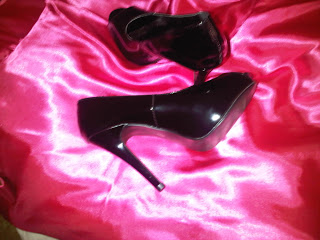The Hitchhiker's Guide to the Galaxy is a remarkable book - which has the words "Don't Panic" written in friendly letters on the cover.
"Don't Panic" is good advice, whether you're out adventuring around the galaxy, or in everyday life, or in dealing with a chronic illness that sometimes sends strange things your way.
I am a panicker (I don't know if that's a real word, but you know what I mean.)
I have a tendency to over-react to things. Mr Wonderful and my kids would say something like "Really? We'd never noticed!"
The good news is my psychologist is helping me with this. (Yes, I see a psychologist. As well as having a tendency to panic, I also have a tendency towards depression. I have lupus, I've got stuff to get sad about.)
She has had me start on a program called "Overcoming Panic" which is written by psychologist John Franklin. (I couldn't get you a link on Amazon for details of this one, but you can take a look at it on the Australian Psychological Society's website.)
This program involves nine weeks of daily work at home, combined with visits to the psychologist. It works the basis of Cognitive Behavioural Therapy, which tells us that what we think affects what we feel.
The training in the book gives an explanation of panic attacks, helps to go through and say exactly what things in my life lead me susceptible to them, and then teaches techniques to help prevent them in future.
I'm just getting through the theory at the moment, and almost on to learning relaxation exercises and techniques. (Relaxation - that's my kind of exercise!)
I've come up with something interesting in the theory. I said CBT works on the idea that what we think affects how we feel.
Panic attacks happen because I (or whoever else has them, but we'll use me for the sake of making it easy to talk about) am stressed or under pressure. This pressure may have been building up for some time for any number of reasons: physical, environmental, emotional, relational, etc, etc. The stress I feel causes bodily changes eg a racing heart, sweating, breathlessness, etc. The panic attack happens when I notice the physical feelings and misinterpret them as something really, incredibly, bad (eg racing heart as a heart attack.) One of the things one needs to do is to stop and say, whatever is happening, how bad can it really be?
I have lupus - if something strange is happening in my body, it could be incredibly bad. That pounding heart may be anxiety, or it may be any number of conditions that can be caused by lupus. That shortness of breath? Maybe it's anxiety, or maybe it's asthma, or maybe it's lupus attacking my airways.
Realistically, if my heart is pounding, I'm sweating profusely, finding it hard to breathe, and maybe even feeling light-headed, I'm probably having a panic attack, or coming down with the flu. But there's always that chance that what's happening is that a really big, bad, lupus flare is doing something big and bad to me.
Then again, if it were a massive lupus flare doing something massively nasty, panicking probably wouldn't help me much at all.
I'm looking forward to getting on to the stage of the program, where I learn the techniques to stop the panic attack, just in case something happens that I really need to keep my head together for!
Reference:
Franklin, John.
Overcoming Panic: A Complete Nine-Week Home-Based Treatment Program for Panic Disorder. Melbourne: Australian Psychological Society, 1996.
Available from The Australian Psychological Society.

